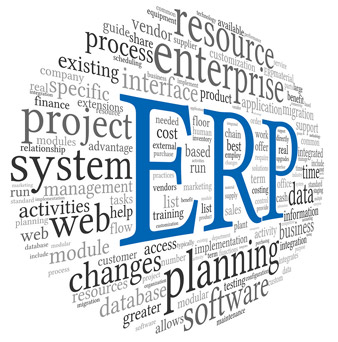ERP stands for Enterprise Resource Planning. ERP is a way to integrate the data and processes of an organization into one single system. Usually ERP systems will have many components including hardware and software, in order to achieve integration, most ERP systems use a unified database to store data for various functions found throughout the organization.
With an ERP system, the customer order information is entered once and then available throughout the business. Every department is better placed to carry out its task and you have clear and timelier information on which to base critical business decisions.
Today's ERP systems can cover a wide range of functions and integrate them into one unified database. For instance, functions such as Human Resources, Supply Chain Management, Customer Relations Management, Financials, Manufacturing functions and Warehouse Management functions were all once stand alone software applications, usually housed with their own database and network, today, they can all fit under one umbrella - the ERP system.
Why should you be interested? Because, a well-implemented and appropriate ERP system can create significant efficiencies across your business, resulting in timely business information, better customer relationships, a more cost-effective supply chain, improved internal process and, ultimately, increased profitability.
Once an ERP system is in place, usually all aspects of an organization can work in harmony instead of every single system needing to be compatible with each other. For large organizations, increased productivity and less types of software are a result.
Implementation of an ERP System
Implementing an ERP system is not an easy task to achieve, in fact it takes lots of planning, consulting and in most cases 1.5 months to 1 year + ERP systems are extraordinary wide in scope and for many larger organizations can be extremely complex. Implementing an ERP system will ultimately require significant changes on staff and work practices. While it may seem reasonable for an in house IT staff to head the project, it is widely advised that ERP implementation consultants be used, due to the fact that consultants are usually more cost effective and are specifically trained in implementing these types of systems.
Shyam Technology provide Enterprise resource planning (ERP) software supports the entire business process. Typically, ERP consists of modules such as marketing and sales, field service, production, inventory control, distribution, human resources (HR), etc. With new innovations in ERP development and designs, software applications have been ingrained to aid business managers execute these solutions in business activities such as inventory control, data order tracking, customer relation service, besides finance. We deliver ERP as a subscription service, ERP On Demand is available for small to mid-sized businesses looking for a low initial investment and reduced overhead and maintenance - available in selected markets. It is, in a sense, a convergence of people, hardware and software into an efficient production, service and delivery system that creates profit for the company.
Accounting & Inventory Management

